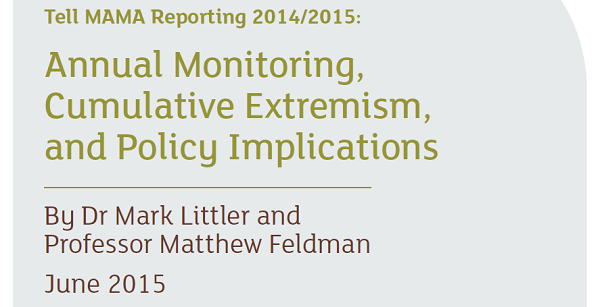Distribution of anti-Muslim literature in UK is on high, says report
Islamabad, Pakistan: A faith abuse monitoring report indicates that distribution of anti-Muslim literature in UK is increasing Muslim women are still the main target of abuse and anti-Muslim attacks.

An Annual Monitoring report titled “Cumulative Extremism, and Policy Implications” written by Dr Mark Littler and Professor Matthew Feldman and published by Teesside University Middlesbrough Tees Valley United Kingdom indicates Muslim women are still the main target of abuse and anti-Muslim attacks (Off-line real) were generally female (48 reports). Report is based on data collected as part of the Tell MAMA (Measuring Anti-Muslim Attacks) initiative during the 2014/15 reporting period (1 March 2014 to 28 February 2015),
The report recommends government authorities to take steps to foster increased engagement with the Muslim community in order to build trust, enhance credibility, and overcome persisting reticence to the reporting of anti-Muslim hatred.
The report also observed and included a case study on ‘cumulative extremism’, using data from the periods surrounding attacks by self-styled jihadi Islamists in Paris, Copenhagen and Sydney in late 2014/early 2015. The report’s principle findings are as follows:
Overall
The overall level of anti-Muslim cases reported to Faith Matters during 2014/15 was broadly consistent with that reported in the 2012/13 year, though showing a significant reduction in the overall number of reports compared with 2013/14 (quite possibly due to the well-documented spike in the reporting of attacks following the murder of Drummer Lee Rigby).
Online incidents continue to make up the bulk of cases reported to Faith Matters (402 of 548 cases, or roughly two thirds).
Online Incidents
Of the 402 online incidents recorded, the majority were coded as anti-Muslim abuse (385), with significant numbers of attacks also coded for the dissemination of anti-Muslim literature (372). Threats of offline action remained comparatively rare (only 78 cases in total).
Where recorded, the victims of online incidents were generally reported to be male.
Less than half (186 of 402, or c.45%) of all recorded online incidents were coded as having been reported to the police.
Offline Attacks
Offline anti-Muslim attacks were overwhelmingly reported to be perpetrated by white (68, versus 5 BME) males (59, versus 21 female perpetrators).
The victims of offline anti-Muslim attacks were generally female (48 reports).
A significant number (44) of victims reported being targeted while wearing distinctively Muslim dress.
The offline attacks reported were overwhelmingly characterised by abuse (103 cases).
Significant numbers were also coded for property damage (15), threats (29), and assault (21).
Less than 10% (7) of cases reported the use of extreme violence.
Cumulative Extremism
Through an analysis of data from the periods immediately before and after jihadi Islamist attacks in Sydney, Paris and Copenhagen, this report provides further empirical evidence in support of the ‘cumulative extremism’ hypothesis. If of varied magnitude, the data nevertheless registers a spike in the number of reported anti-Muslim cases in the periods immediately following each high-profile jihadi Islamist attack.
When disaggregated, spikes were only consistently present in the reporting of online incidents, with the number of reported offline attacks falling after both the Sydney and Copenhagen murders.
Differences in the scale of ‘cumulative extremism’ may reflect the influence of a number of considerations, including geography, salience, social proximity, number of casualties, and, perhaps above all, the framing of media coverage.
Recommendations
In light of these findings, our report identifies several potential policy implications. Specifically, we
Suggest that policy makers should consider the following:
Take steps to foster increased engagement with the Muslim community in order to build trust, enhance credibility, and overcome persisting reticence to the reporting of anti-Muslim hatred.
Implement a broader programme of education aimed at tackling the underlying root causes of anti-Muslim extremism.
Vigorously prosecute the perpetrators of anti-Muslim hatred, in order to reinforce perceptions within the Muslim community that all forms extremism are a high-priority policy issue.
Engage with online providers (ISPs, social networks, hosting companies etc.) to better identify the perpetrators of online hate crime.
Engage with the media to promote a more nuanced understanding of terrorist motivations, in order to reduce the impact of coverage relating to, or even fuelling, instances of ‘cumulative extremism.
Complete report can be read or down load to click this link





